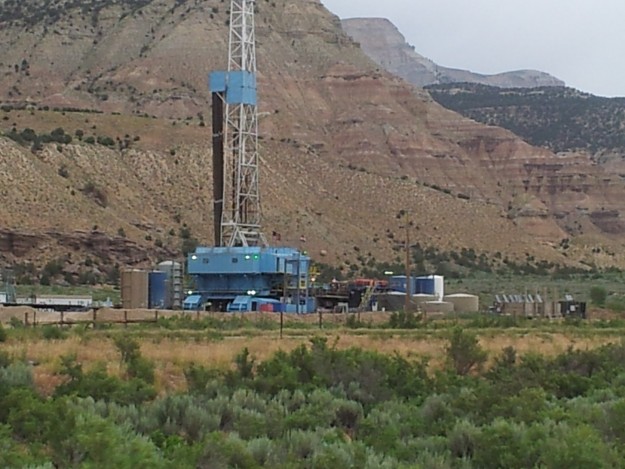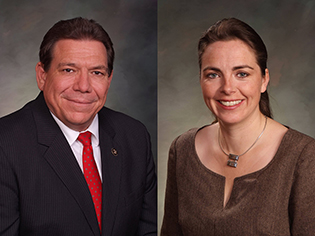Editor’s note: A version of this story first appeared in The Colorado Statesman:
While Colorado’s economy continues its solid rebound along the state’s Front Range, areas of the Western Slope are still stuck in the mud of the Great Recession, especially counties dependent on coal mining and gas drilling. There are sharp differences between rural-district Democrats and Republicans on how best to ease that economic pain.
State Sen. Kerry Donovan, a Vail Democrat whose sprawling Western Slope district includes several of those counties, wants to try again to provide those rural areas with some relief this coming legislative session — both through emergency grants and expedited broadband Internet to attract a greater diversity of businesses and truly boost the Western Slope economy.
“I’m anxious to bring it back and get it passed this year,” Donovan said of the first bill she floated in her first year as a senator last session, the Rural Economic Emergency Grant Program. The legislation would have created a $2 million fund for job training and other support services for communities hit by job losses caused by a major event, such as a mine closure.
The bill was killed on a party-line vote by Republicans in the Senate State, Veterans and Military Affairs Committee. Donovan said it was pure politics at work, because she was coming off a close, hard-fought election against Republican Don Suppes. The need for the grant program is even more pronounced heading into 2016, Donovan contends.
“If we could set up a grant program that would bring together all the resources of the state under one umbrella, and then bring those resources to these small communities to react to these large job losses, then these really hardworking Coloradans would be able to stay in their communities and get a little bit ahead while we’re at it,” Donovan told The Colorado Statesman.
According to a Colorado Division of Reclamation Mining and Safety report released earlier this month, the state’s underground coal mines produced 14 percent less coal in the first 10 months of 2015 than they did in the same period in 2014, a year that was reportedly the worst for the industry since 1994. The total number of miners in Colorado dropped from 1,653 in October of 2014 to 1,410 in September of this year, a 15-percent decrease.
In November, the Bowie No. 2 Mine near Paonia in the state’s coal-rich North Fork Valley, cut 78 of its 181 full-time jobs. Many more layoffs have occurred in recent years at mines near Paonia, on the eastern end of Delta County, part of Donovan’s sprawling Senate District 5.
“In our budget situation it’s going to be a harder lift than before to make sure that people prioritize dollars for a program like this, but we’re continuing to hear about layoffs in mining communities and other large-scale job layoffs, which is a different story from what is happening in the Denver metro area where the headlines are about companies moving in and new jobs,” Donovan said.
Glen Black, interim city manager and economic development director for Delta, said the hard-hit town is focused on steps to attract other businesses to help diversify the local economy, including using part of $5.2 million Colorado Department of Local Affairs grant to the Region 10 nonprofit that’s aimed at bringing in broadband Internet.
“I’m not sure that we’ll ever offset [coal mining job losses] but what we want to do is make sure that we do diversify and that we’re hopefully a lot more resilient because we have diversified and have the opportunity to bring other industries into the area,” Black said.
State Sen. Ray Scott, a Grand Junction Republican who serves on the committee that killed Donovan’s bill last session, said that until federal policies hurting the coal industry change — possibly after next November’s presidential election — the state will continue to suffer no matter what the Legislature does.
Scott points to a bill he helped pass last session, the Jump-Start Program for Economically Distressed Counties, as a better way to assist hard-hit communities than Donovan’s grant program, which he said will have a hard time passing this session.
“That was the problem I saw with that particular bill is when you just have a money giveaway basically, which is what it looked like, or was, what was it going to accomplish?” Scott told The Statesman. “If you did the math, it was like giving everybody 10 bucks and saying, ‘Here you go.’ The point of that is what?”
Instead, Scott recently attended a press conference at Colorado Mesa University where the Jump-Start program was extolled. The bill, which Donovan also supported, creates tax-friendly zones to attract innovative businesses such a biodegradable bottle-manufacturing company in his district in Mesa County, Scott said.
“We have to develop ideas that give that hand up and not that hand out, because once you’ve done that and somebody says, ‘Hey, it’s free groceries,’ why would they have to work to get anything else?” Scott said. “If the coal jobs are gone and you don’t have something that can replace that immediately, you’ve got kind of a problem.”
Donovan said she hopes politics won’t come into play when she takes another run at the bill this session.
“Politics killed it,” she said. “It had industry support; it had bipartisan support; it was the first bill that I introduced after coming off a very competitive election, and it didn’t die because it was bad policy. It died because politics trumped policy.”
Scott denies politics played any part in the decision.
“Grant money for nonspecific purposes is a nonstarter,” he said, adding that Jump-Start, even with its more tangible benefits, barely passed in the face of of intense criticism. “The Jump-Start bill only passed by three votes in the Senate, because some people did view that on both sides of the aisle as a giveaway. There was a kind of mixed bag of votes on that issue as well.”
Donovan is also weighing a bill to better coordinate state broadband funding, especially in rural areas with a high quality of life and low cost of living where small businesses might like to set up shop but are hindered by a lack of connectivity.
“Having fast, robust Internet is really a way for communities to attract people into their towns, so if you can make it so that all these great jobs that are geographic agnostic — they can live wherever they want as long as there’s internet — then there’s an incredible number of places in Colorado that I think people would want to put roots down in,” she said.
— davido@realvail.com




